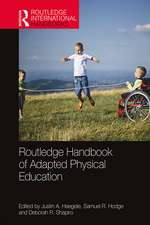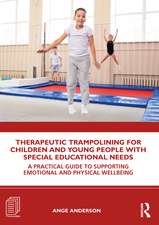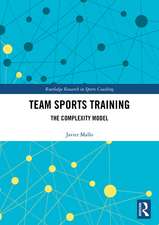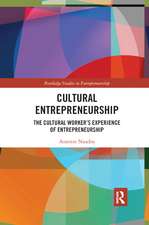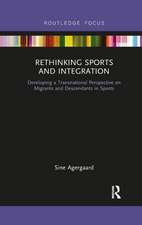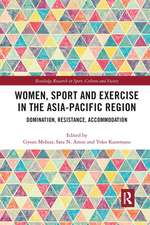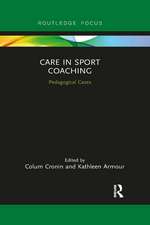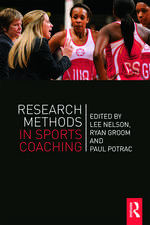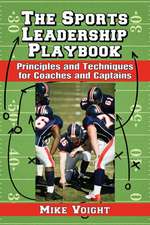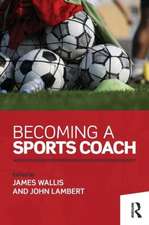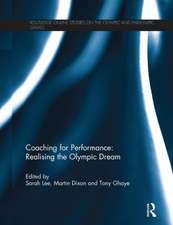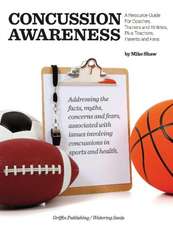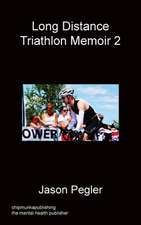Routledge Handbook of Talent Identification and Development in Sport: Routledge International Handbooks
Editat de Joseph Baker, Stephen Cobley, Jörg Schorer, Nick Wattieen Limba Engleză Hardback – 16 mar 2017
With contributions from leading researchers and practitioners, this book offers a complete overview of contemporary talent identification and development from in-depth discussion of methodological and philosophical issues through to practical applications. Adopting an international and multi-disciplinary approach, it addresses all key aspects of the talent identification and development process, including skill acquisition and motor learning, psychological factors and family influences, creating optimal environments for performance, and dealing with injury and rehabilitation.
Presenting an unrivalled wealth of research, the Routledge Handbook of Talent Identification and Development in Sport is an essential resource for any undergraduate or postgraduate degree course in sport studies, sport science, sport coaching or sport management, as well as for sport policymakers, analysts and coaches.
| Toate formatele și edițiile | Preț | Express |
|---|---|---|
| Paperback (1) | 361.19 lei 22-36 zile | +39.26 lei 5-11 zile |
| Taylor & Francis – 12 dec 2019 | 361.19 lei 22-36 zile | +39.26 lei 5-11 zile |
| Hardback (1) | 1247.58 lei 43-57 zile | |
| Taylor & Francis – 16 mar 2017 | 1247.58 lei 43-57 zile |
Din seria Routledge International Handbooks
-
 Preț: 371.78 lei
Preț: 371.78 lei -
 Preț: 375.50 lei
Preț: 375.50 lei -
 Preț: 362.19 lei
Preț: 362.19 lei -
 Preț: 352.08 lei
Preț: 352.08 lei - 9%
 Preț: 1487.70 lei
Preț: 1487.70 lei - 5%
 Preț: 317.31 lei
Preț: 317.31 lei -
 Preț: 372.05 lei
Preț: 372.05 lei -
 Preț: 361.19 lei
Preț: 361.19 lei -
 Preț: 390.13 lei
Preț: 390.13 lei -
 Preț: 311.91 lei
Preț: 311.91 lei - 9%
 Preț: 1488.67 lei
Preț: 1488.67 lei -
 Preț: 390.22 lei
Preț: 390.22 lei -
 Preț: 347.74 lei
Preț: 347.74 lei -
 Preț: 347.74 lei
Preț: 347.74 lei - 9%
 Preț: 1490.11 lei
Preț: 1490.11 lei -
 Preț: 356.22 lei
Preț: 356.22 lei -
 Preț: 348.27 lei
Preț: 348.27 lei - 5%
 Preț: 328.11 lei
Preț: 328.11 lei -
 Preț: 394.24 lei
Preț: 394.24 lei - 8%
 Preț: 392.89 lei
Preț: 392.89 lei - 8%
 Preț: 422.42 lei
Preț: 422.42 lei -
 Preț: 357.22 lei
Preț: 357.22 lei - 8%
 Preț: 421.97 lei
Preț: 421.97 lei - 5%
 Preț: 452.16 lei
Preț: 452.16 lei -
 Preț: 341.55 lei
Preț: 341.55 lei - 9%
 Preț: 1651.61 lei
Preț: 1651.61 lei - 9%
 Preț: 1665.70 lei
Preț: 1665.70 lei -
 Preț: 381.91 lei
Preț: 381.91 lei -
 Preț: 350.20 lei
Preț: 350.20 lei -
 Preț: 347.74 lei
Preț: 347.74 lei - 20%
 Preț: 1401.00 lei
Preț: 1401.00 lei -
 Preț: 342.76 lei
Preț: 342.76 lei -
 Preț: 345.63 lei
Preț: 345.63 lei -
 Preț: 345.16 lei
Preț: 345.16 lei -
 Preț: 353.88 lei
Preț: 353.88 lei -
 Preț: 1057.72 lei
Preț: 1057.72 lei -
 Preț: 344.90 lei
Preț: 344.90 lei - 5%
 Preț: 337.33 lei
Preț: 337.33 lei -
 Preț: 365.90 lei
Preț: 365.90 lei - 9%
 Preț: 1528.86 lei
Preț: 1528.86 lei -
 Preț: 346.77 lei
Preț: 346.77 lei -
 Preț: 392.48 lei
Preț: 392.48 lei - 9%
 Preț: 1454.51 lei
Preț: 1454.51 lei - 5%
 Preț: 326.85 lei
Preț: 326.85 lei -
 Preț: 346.11 lei
Preț: 346.11 lei -
 Preț: 361.74 lei
Preț: 361.74 lei - 9%
 Preț: 1349.74 lei
Preț: 1349.74 lei - 19%
 Preț: 422.81 lei
Preț: 422.81 lei - 8%
 Preț: 385.56 lei
Preț: 385.56 lei
Preț: 1247.58 lei
Preț vechi: 1673.96 lei
-25% Nou
Puncte Express: 1871
Preț estimativ în valută:
238.73€ • 249.88$ • 198.69£
238.73€ • 249.88$ • 198.69£
Carte tipărită la comandă
Livrare economică 31 martie-14 aprilie
Preluare comenzi: 021 569.72.76
Specificații
ISBN-13: 9781138951778
ISBN-10: 1138951773
Pagini: 526
Ilustrații: 132
Dimensiuni: 174 x 246 x 35 mm
Greutate: 1.02 kg
Ediția:1
Editura: Taylor & Francis
Colecția Routledge
Seria Routledge International Handbooks
Locul publicării:Oxford, United Kingdom
ISBN-10: 1138951773
Pagini: 526
Ilustrații: 132
Dimensiuni: 174 x 246 x 35 mm
Greutate: 1.02 kg
Ediția:1
Editura: Taylor & Francis
Colecția Routledge
Seria Routledge International Handbooks
Locul publicării:Oxford, United Kingdom
Public țintă
Postgraduate and UndergraduateNotă biografică
Joseph Baker is Professor and Head of the Lifespan Health and Performance Laboratory at York University, Canada. He has also held Visiting Researcher/Professor positions in the UK, Australia and Germany. His research examines the varying factors affecting skill acquisition and maintenance across the lifespan. Joe is Past President of the Canadian Society for Psychomotor Learning and Sport Psychology and the author/editor of eight books, four journal special issues and more than 200 peer-reviewed articles and book chapters.
Stephen Cobley is a Senior Lecturer in Motor Control and Skill Acquisition and Sport and Exercise Psychology in the Faculty of Health Sciences at the University of Sydney, Australia. His research interests examine the factors that facilitate or inhibit athlete development from a bio-ecological and multi-disciplinary perspective. His research and applied work has led to the evaluation, modification and writing of athlete development programs and policy for numerous sport organizations. Steve is an Associate Editor for the Journal of Science and Medicine in Sport, and previously co-edited Talent Identification and Development: International perspectives (Routledge, 2012).
Jörg Schorer is Professor of Sport and Movement Science at the Carl-von-Ossietzky-University in Oldenburg, Germany. He has worked in academia as well as in the applied talent sector. His research focuses on elite sport across the lifespan.
Nick Wattie is an Assistant Professor in the Faculty of Health Sciences at the University of Ontario Institute of Technology, Canada. His research examines various factors related to talent identification and development in sport, with an emphasis on the influence of a range of environmental, individual and task constraints on expertise in sport, skill acquisition and positive youth development, as well as athlete morbidity and mortality.
Stephen Cobley is a Senior Lecturer in Motor Control and Skill Acquisition and Sport and Exercise Psychology in the Faculty of Health Sciences at the University of Sydney, Australia. His research interests examine the factors that facilitate or inhibit athlete development from a bio-ecological and multi-disciplinary perspective. His research and applied work has led to the evaluation, modification and writing of athlete development programs and policy for numerous sport organizations. Steve is an Associate Editor for the Journal of Science and Medicine in Sport, and previously co-edited Talent Identification and Development: International perspectives (Routledge, 2012).
Jörg Schorer is Professor of Sport and Movement Science at the Carl-von-Ossietzky-University in Oldenburg, Germany. He has worked in academia as well as in the applied talent sector. His research focuses on elite sport across the lifespan.
Nick Wattie is an Assistant Professor in the Faculty of Health Sciences at the University of Ontario Institute of Technology, Canada. His research examines various factors related to talent identification and development in sport, with an emphasis on the influence of a range of environmental, individual and task constraints on expertise in sport, skill acquisition and positive youth development, as well as athlete morbidity and mortality.
Cuprins
Section I: Talent Identification1. Talent Identification and Development in Sport: An introduction[Joseph Baker, Stephen Cobley, Jörg Schorer and Nick Wattie]2. Does Talent Exist? Yes![Dean Keith Simonton]3. Does Talent Exist? A re-evaluation of the nature-nurture debate[Paul Ward, Patrick Belling, Erich Petushek and Joyce Ehrlinger]4. Conceptions of Giftedness and Talent [Christiane Fischer-Ontrup and Christian Fischer]5. How Contemporary International Perspectives Have Consolidated a Best-Practice Approach for Identifying and Developing Sporting Talent[Juanita R. Weissensteiner]6. Why Conceptualizations of Talent Matter: Implications for Skill Acquisition and Talent Identification and Development[Nick Wattie and Joseph Baker]7. On the Efficacy of Talent Identification and Talent Development Programmes[Arne Güllich and Stephen Cobley] 8. Applied Statistics for Practitioners and Researchers[Dirk Büsch and Urs Granacher] Section II: Talent Development9. Sport Activity in Childhood: Early specialisation and diversification[Paul R. Ford and A. Mark Williams]10. Method in the Madness: Working towards a viable ‘paradigm’ for better understanding and supporting the athlete pathway[Juanita R. Weissensteiner]11. Talent Identification and Development in the Context of Growing Up[Robert M. Malina, Sean P. Cumming, Manuel J. Coelho e Silva and António J. Figueiredo]12. Psychological Factors in Developing High Performance Athletes[Anne-Marie Elbe and Johan Wikman]13. Family Influences on Talent Development in Sport[Camilla J. Knight]14. Understanding Environmental and Task Constraints on Talent Development: Ana
Descriere
Identifying athletic talent and developing that talent to its full potential is a central concern in sport. Understanding talent identification and its implications for both positive and negative developmental outcomes is crucial to sporting success. This is the first comprehensive resource for scientists, researchers, students, coaches, analysts and policymakers looking to improve their knowledge of the talent identification and development process.


